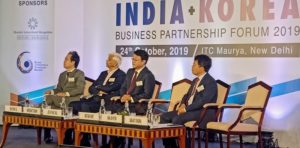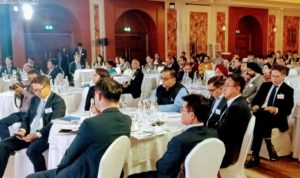Indian consumers now prefer Korean brands over Japanese: Amitabh Kant, CEO, NITI Aayog
The NITI Aayog CEO said Korean brands are the most popular in India, and now consumers here prefer Korean brands over Japanese.
NEW DELHI. Amitabh Kant, the CEO of NITI Aayog – the country’s apex think tank and economic policy advisory institution, has said Korean brands are the most popular products in India, and now consumers here prefer Korean brands over Japanese.
Kant also said that India wanted Korea to pump more investment into India and become among the top five FDI (foreign direct investment) investors, and upgrade from its current 14th position.
“Many of us use Samsung phones, LG refrigerators, and Hyundai cars. All of us have got used to the Korean brands. Earlier we would use Japanese brands, now we have switched over to Korean brands in India and they are the most popular products here,” Kant said this while addressing a gathering at the India-Korea Business Partnership Forum 2019 in New Delhi on October 24.
While inviting Korean companies to invest more in India, Kant said India would like to further accelerate its collaboration with Korea in the IT and electronics sphere.
“We provided a huge amount of handholding to Samsung, and we expect that it would relocate all its manufacturing from different parts of the world to India. Whatever support Samsung would need, we will be happy to provide,” he said.
Also read: Slowdown haunts! But Koreans, Japanese see it differently, have BIG plans in India
Kant said that there lied a huge opportunity for Korea not merely in the branded products but also in telecom, biotechnology, manufacturing, and digital collaborations. He said India was going to grow in all these areas, as it had had over a billion biometrics, billion mobile phones, and billion bank accounts.
This statement that would apparently irk the Japanese corporate world came at the time when Japanese companies are bringing huge foreign direct investment (FDI) in India not only in the infrastructure but also in consumer products. Japan’s global life-wear consumer brand Uniqlo recently made its maiden entry in India recently.
Also read: Japanese lifewear retail brand UNIQLO enters Indian market
Amitabh Kant said India expected Korea to consolidate its position of FDI investor in India and rank up to be among the top five investors from the current position of 14th largest FDI investor in India.
“The Korean investment in India was US$ 3.96 billion between April 2000 and March 2019 but we want Korea to invest more here and be among the top five investors in India. Our bilateral trade is around US$ 21.5 billion. We offer large markets and myriad of opportunities,” said the top NITI Aayog man.
Formerly known as Planning Commission, NITI Aayog is the premier policy Think Tank of the Government of India, providing both directional and policy inputs.
With Prime Minister Narendra Modi as its Chairman, the Governing Council of NITI Aayog comprises of union ministers, chief ministers, and Lt. Governors of Union Territories (UTs).
 Those present during the India-Korea Business Partnership Forum 2019 organised jointly by Confederation of Indian Industries (CII) and Korea International Trade Association (KITA) included Hyung-cheol Joo, Chief, Presidential Committee, New South Policy, Republic of Korea, Shin Bong-kil, Ambassador, ROK, Jin Hyun Han, Executive Vice Chairman, KITA, Hee Chul Jung, Representative (Director), KITA in India, Kim Kum-pyoung, Director of Korean Cultural Centre India (KCCI), Sanjay Chadha, Additional Secretary, Department of Commerce & Industry, Government of India, Manish Chawla, Co-chairman, Regional Committee on Entrepreneurship & start-ups and Shreekant Somany, Chairman, CII MSME Council, Past Chairman CII-Northern Region & Chairman and Managing Director, Somany Ceramics Limited among others.
Those present during the India-Korea Business Partnership Forum 2019 organised jointly by Confederation of Indian Industries (CII) and Korea International Trade Association (KITA) included Hyung-cheol Joo, Chief, Presidential Committee, New South Policy, Republic of Korea, Shin Bong-kil, Ambassador, ROK, Jin Hyun Han, Executive Vice Chairman, KITA, Hee Chul Jung, Representative (Director), KITA in India, Kim Kum-pyoung, Director of Korean Cultural Centre India (KCCI), Sanjay Chadha, Additional Secretary, Department of Commerce & Industry, Government of India, Manish Chawla, Co-chairman, Regional Committee on Entrepreneurship & start-ups and Shreekant Somany, Chairman, CII MSME Council, Past Chairman CII-Northern Region & Chairman and Managing Director, Somany Ceramics Limited among others.
According to Amitabh Kant the Indian government took many measures to attract Korean investment into the country.
He stated India jumped 14 ranks from 77 to 63 in the World Bank’s Ease of Doing Business indicators but the Prime Minister has set the target to be in the top 50 by next year and top 25 in the next three years.
Kant stated that this was the result of the Government’s drive to improve the business environment in the country. He pointed out that over the years the Government has been liberalizing its FDI regime and today around 98% of FDI can come in through the automatic approval route. A dedicated Korea Plus desk had also been set up to facilitate Korean Investment in India, he added.
Kant pointed out that India was just beginning on its journey of urbanization which offered many opportunities for Korean companies to collaborate in India.
“100 smart cities are being created, 50 new metros are being set up along with other infrastructure such as airports and up-gradation of 500 railway stations. This offered a very good opportunity for Korean companies to expand their footprint in India,” he said.
 According to Hyung-cheol Joo, Advisor to the President of South Korea for Economic Affairs and Chairman of the Presidential Commission on New Southern Policy, Republic of Korea, India – Korea collaboration has a strong base.
According to Hyung-cheol Joo, Advisor to the President of South Korea for Economic Affairs and Chairman of the Presidential Commission on New Southern Policy, Republic of Korea, India – Korea collaboration has a strong base.
“World is going through substantial changes, bringing lots of opportunities and risks. Rising protectionism is spelling trouble for global economic trade and growth. This disruption is changing the way we communicate and work. Against this backdrop, the special strategic partnership between Korea and India has become more vital than ever. The presidential committee which is the control tower of our efforts to put Korea’s relations with India at par with Korea’s four major diplomatic partners USA, China, Russia, and Japan,” said Hyung-cheol Joo.
He said more than 500 Korean companies were currently operating in India and Indian companies like the Tatas and the Mahindras had laid down roots in Korea. He was of the view that the New Southern Policy of Korea and India’s Act East Policy complimented each other and formed a strong basis for the partnership.
According to Shin Bong Kil, Ambassador, Embassy of the Republic of Korea there is a huge potential to improve bilateral trade and investment between the two countries. He stated that bilateral trade was currently at around US$ 25 billion and was well on its way to meet the US$ 50 billion target set by the two governments for the year 2030. He was of the view that cooperation between SMEs and startups held the key to future collaboration between the two countries.
According to Sanjay Chadha, Additional Secretary, Department of Commerce, Ministry of Commerce and Industry, Government of India stated that a review of the India – Korea Comprehensive Economic Partnership Agreement (IKCEPA) to further promote bilateral trade between India and Korea. He was of the view that India has tremendous potential in increasing its market share in Korea in terms of goods such as drugs and pharmaceuticals and services such as IT and Medical Services.
Shreekant Somany, Chairman, CII MSME Council, Past Chairman CII-Northern Region & Chairman and Managing Director, Somany Ceramics Limited stated that the two countries could work together in sectors such as conventional and renewable energy, leather and leather products and tourism.
The session was moderated by Han Jin Hyun, Executive Vice Chairman, Korea International Trade Association (KITA), Korea.


